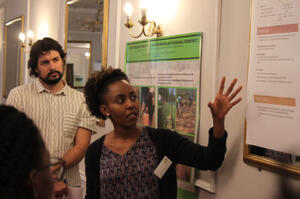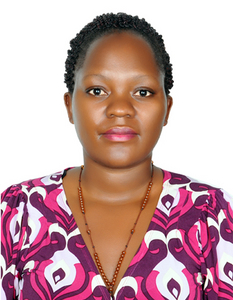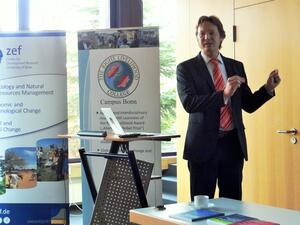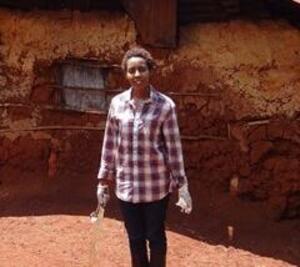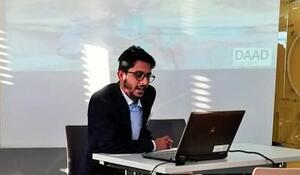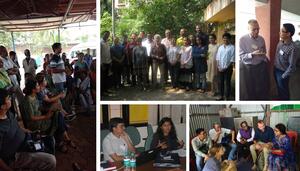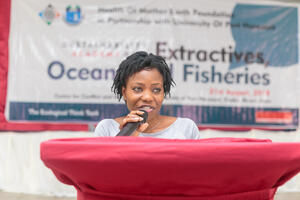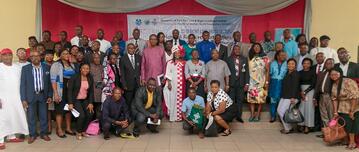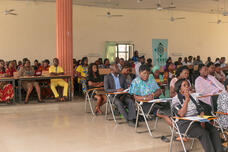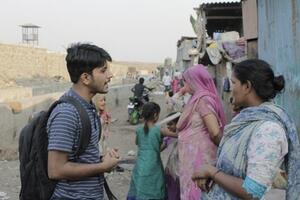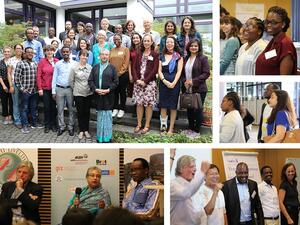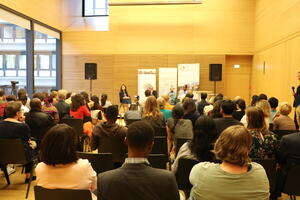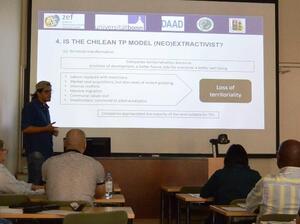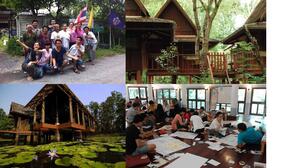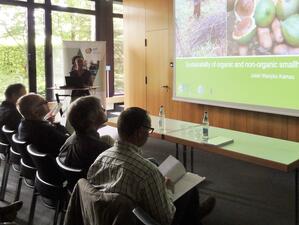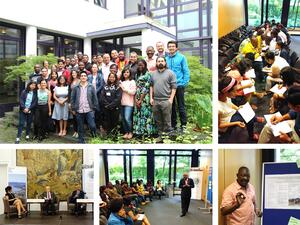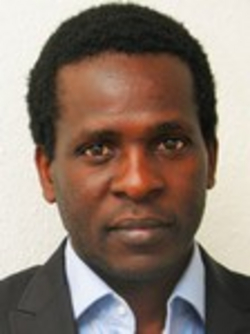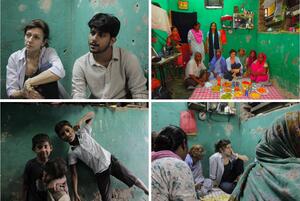Activities and Events 2018
RLC Bonn PhD Alumna Juliet Wanjiku speaks in South Africa
From November 4-11, 2018, RLC Bonn PhD Alumna Juliet Wanjiku spoke at the international summer school „Green and Social Entrepreneurship for Biodiversity Conservation and Local Development“ in the South African province of KwaZulu Natal, co-organized by the Center for Development Research (<link zefhome>ZEF).
The summer school explored various concepts and ideas regarding social and green entrepreneurship in theory and practice. Furthermore, it critically examined those concepts in terms of aspects of sustainability.
Juliet Wanjiku presented a poster on the potential of organic agriculture as a green and social entrepreneurial venture, which may contribute to improved biodiversity and local development in Kenya and beyond, as farmers seek to combine farm business practices with sustainable development.
Interview with the new RLC Bonn PhD student Dorothy Birungi
What is your research topic and why did you choose it?
My PhD working title is “Agroecological Intensification of smallholder farming systems through perennial Pigeon pea/Sorghum husbandry in Northern Uganda”. It is linked to the larger project “Perennial polyculture farming in Uganda: Towards increased sustainability, resilience and livelihoods of smallholder farmers”.
What are your primary research objectives?
1. To understand farmer’s knowledge, perceptions and management practices of the new perennial crops in Uganda
2. To determine the economic costs and benefits of perennial pigeon pea/sorghum in Northern Uganda 3. To determine the market demand opportunities and preferences for perennial crops in Northern Uganda
4. Ecosystem services from perennial agriculture farming (map/value??)
How did you come across the RLC doctoral programme and why did you apply for it?
I was contacted in Uganda by a colleague when this position was advertised early this year. I worked on the application package, submitted and went through the interview process successfully. I applied for this position because it aims to address key agricultural development challenges that smallholder farmers in Sub-Saharan Africa are currently facing: issues of increasing food production ecologically without damaging the natural resources for future generations. The current agricultural methods are described as Modern Extractive Agriculture (MEA) which is environmentally and ecologically unsustainable. If farmers change their cropping methods from annual to perennial, they will have several social, economic and ecological benefits. In addition, my previous M.Sc. research focused on adoption of Conservation Agriculture Practices among smallholder farmers in Uganda and Kenya which is also related to this project. The aims of RLC for training changemakers inspired me to apply as its one of my long-term goals to carry out research that impacts rural livelihoods. The RLC scholarship aims at connecting young researchers with Right Livelihood Award Laureates.
Which are the partners you will be working with?
The RLC scholarship allows me to work in a team with Right Livelihood Laureates, experts at RLC Campuses and partners in Uganda. Some of the international partners include the Land Institute, Kansas, USA, who received the Right Livelihood Award in 2000 for their pioneering work on perennial crops. The institute has so far set up demonstration sites in Uganda and they are working with smallholder farmers in Uganda to evaluate the adaptability of these crops for the local environments. This provides the foundation and basis for this PhD.
Your doctoral programme started in August already. How have you experienced your first couple of months at ZEF/RLC?
I am currently participating in the BIGS-DR doctoral program where I have so far attended the German language course for the first two months, and an interdisciplinary course for the months of October and November. The highlight so far is the diversity of the courses which has broadened my thinking from disciplinary to an interdisciplinary thinking. Before joining ZEF/RLC, my discerning was basically around the social-economic viewpoints, however, I have now broadened to embrace ecological and natural resource perspectives which is also crucial to address part of the PhD objectives. I have also networked with several researchers at ZEF/RLC and round Bonn, which connections are crucial for academic and social aspects of the PhD journey.
Professor from RLC Valdivia visits RLC Bonn
On November 22, 2018, Prof. Dr. Felix Fuders from the RLC Campus in Valdivia, Chile, gave a talk on “How to fulfil the SDG’s: The role of money” at the RLC Campus Bonn. Fuders pointed out that the global financial system forces the obligation to economic growth. Economic growth is carried out exponentially, but as the earthly resources are finite, the whole system will collapse eventually and therefore economic growth is a contradiction to sustainability. In the context of the SDG’s (Sustainable Development Goals), Fuders argued that SDG No. 8, namely “Economic Growth” is the least recognised cause for market failure and thus contradicts the achievements of the remaining SDG’s.
If you want to learn more about Felix Fuder’s work on the crises of the global capitalist economy and alternatives, click here for a download link to the essay “Local Money as Solution to Capitalist Global Financial Crises”.
Bibliographical Note:
Fuders, Felix (et.al.) (2014) “Local Money as Solution to Capitalist Global Financial Crises”. In: Pirson, M., Mulryne, J.R. (eds.) From Capitalistic to Humanistic Business. Palgrave Macmillan, pp. 48-70.
RLC Bonn PhD Alumnus Juliet Wanjiku Kamau publishes Article on Organic Agriculture
Juilet Wanjiku Kamau, RLC Bonn PhD alumnus, has published the article "Soil fertility and biodiversity on organic and conventional smallholder farms in Kenya" in the journal Applied Soil Ecology. In the article, among other contributors, she raises the question of how far organic agriculture can improve the livelihoods of smallholder farmers. Therefore, her study evaluates and compares soil fertility, decomposition and biodiversity between conventional and organic farms in Kenya, concluding that organic agriculture does have indeed the potential to increase anthropod diversity, but other factors affect its ability to sustain the health of soils.
Click here to download the full article.
Bibliographical note:
Kamau Wanjiku, Juliet, Lisa Biber-Freudenberger, John P.A. Lamers, Till Stellmacher & Christian Borgemeister (2019): "Soil fertility and biodiversity on organic and conventional smallholder farms in Kenya", in: Applied Soil Ecology, Vol. 134, pp. 85-97.
RLC-PhD Candidate Amit Kumar at the 7th "Conference on International Development" at Ruhr-University Bochum from November 8-9
Amit Kumar, the RLC-PhD Candidate at Centre for Development Research (ZEF), has presented a part of his PhD thesis on ‘Photo-pass and the Legitimation Crisis of Urban Planning in Mumbai’ at the 7th PhD Conference on International Development organised by Institute of Development Research and Development Policy (IEE), Ruhr-University Bochum. He was a speaker at the session on ‘Housing and Urban Citizenship in Transforming Cities’ chaired by Prof. Dr Erhard Berner (International Institute of Social Sciences, Erasmus University Rotterdam, The Netherlands).
In the paper presented, Amit strived to trace the genealogy of urban planning with particular reference to slum demolitions in Mumbai. Firstly, he provided a snapshot of the land-management policies in Mumbai. Secondly, he elaborates how the state frames the logic of 'formalising the informal' through documentary evidence, i.e. Photo-pass in the case of Mumbai. Thirdly, he shows how in such a retrospective mode of urban planning the people living in unauthorised slums in Mumbai trump it strategically through counter-documentaries, participating in informal labour markets and forming associations with activist organisations like one of Medha Patkar (Right Livelihood Award Laureate, 1991). Fourth and final, he argues that the urban planning in the Global South, suffers from a crisis of legitimation in between a) the compulsions of democratic populism and b) imperatives of technocratic planning
Apart from participating in the conference, he also networked with some researchers from other universities in Europe and outside. He also met Mr Biswaranjan Tripura, an Assistant Professor at Tata Institute of Social Sciences Mumbai which hosts the Right Livelihood Campus Mumbai, who is currently pursuing his PhD on ‘Indigenous Politics in India’ at IEE, Ruhr-University Bochum. Alejandro Mora Motta, also an RLC-PhD Candidate at the Centre for Development Research (ZEF) participated in the conference as well.
RLC Bonn and RLC Mumbai organised Collaborative Alumni Workshop in October 2018
From 4-6 October, 2018, development academics and practitioners from South East Asia and South Asia gathered in Mumbai at the first ever RLC Alumni workshop. Organised jointly by the RLC Campus at TISS Mumbai and the RLC Global Secretariat in Bonn, Alumni presented current science-practice projects for tackling development-related issues in the area of livelihoods innovation.
Further keynote speeches were delivered by researchers from the Centre for Livelihoods and Social Innovation (CLSI), Tata Institute of Social Sciences (TISS), Indo-German Centre for Sustainability (IGCS), German Academic Exchange Service (DAAD), and the Environmental Policy Research Centre, Free University of Berlin.
Right Livelihood Award Laureate Shrikrishna Upadhyay presented and discuss a regional action plan for sustainable livelihood in countries of South Asia. Upadhyay also spoke on a Public Plenary Panel on “Reimagining Sustainable Livelihoods: Creating Synergies through State-University-Civil Society Partnerships”, joined by Dr. Swati Banerjee, RLC Mumbai Coordinator, and Prof. Abdul Shaban, Deputy Director of TISS, and Dr. Victor Karunan, Chulalongkorn University, Bangkok.
Karunan, who represented the newest RLC Campus in Thailand, urged the importance of South Asian and South East Asian collaborations, and addressed the role of researchers working together with practitioners: “The economic development model that we have, with its political, cultural and psychological consequences, is at the origin of these imbalances. But it is necessary to find solutions urgently. The time has come to put forward new orientations and not just adaptations of the existing system. To reflect on this and to bring together the forces for change has become a top priority.”
On the second workshop day, all participants visited two civil society organisations in Mumbai:
Ghar Bachao Ghar Banao Andolan (GBGBA) was launched as a response to the massive eviction drive that took place in Mumbai, from December 2004 to February 2005. This eviction ruthlessly swept away 90,000 hutments, rendering tens of thousands of poor homeless. One of the founders of NAPM is Right Livelihood Award Laureate Medha Patkar.
UDAAN is a field action initiative of TISS which engages with women at Babanagar in Rafiqnagar, a community which was primarily engaged in waste picking at the vicinity of the Deonar Dumping Ground in Mumbai.
For information regarding the programme and workshop participants, please contact pokraka(at)uni-bonn.de
RLC Bonn PhD student Evelyn Ewere presents her research at the 11th Sustainability Academy in Abuja
Evelyn Ewere Anyokwu, doctoral student at RLC Campus Bonn, presented her ongoing research on “Alternative Extraction for maritime Biorefinery” within the framework of the 4th Annual Public RLC Lecture on "Natural resource extraction, social relations and conflict in Africa" from August 30 until August 31, 2018.
"Alternative Nobel Prize" Laureates Jacqueline Moudeina from Chad and Nnimmo Bassey from Nigeria also participated in the event.
During the two-day event hosted at the Center for Conflict and Gender Studies, Moudeina gave a lecture on natural resources and conflict in Africa, arguing that natural resource extraction, particularly oil, being rather a curse than a blessing in the African context. As solution, Modeina demanded the promoting of good governance of natural resources as well as the overall improvement of democratization.
Prior to the RLC Annual Public Lecture, the Health of Mother Earth Foundation (HOMEF) organised the 11th Sustainability Academy on “Extractives, Oceans and fisheries” in Abuja. Bassey talked about “Privatizing the oceans through pollution” emphasizing the devastating situation of fisher folks in the Niger Delta caused by oil companies and thus by the privatization of natural resources.
Along with Nnimmo Bassey and Jacqueline Moudeina, Dr. Babtunde Bolaji Benard, Legborsi Pyagbara, President of the Movement for the Survival of Ogoni People (MOSOP), spoke about poverty issues arising from land and water pollution caused by oil extraction.
Please find the full report here.
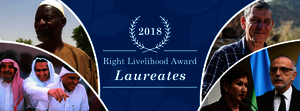
2018 Right Livelihood Award Laureates announced
The Laureates of this year’s Right Livelihood Award, widely known as the ‘Alternative Nobel Prize’, are now announced.
The 2018 Honorary Award goes to anti-corruption champions Thelma Aldana (Guatemala) & Ivan Velásquez (Colombia) “for their innovative work in exposing abuse of power and prosecuting corruption, thus rebuilding people’s trust in public institutions.”
The three cash awards go to the following Laureates:
The civil and human rights defenders Abdullah al-Hamid, Mohammad Fahad al-Qahtani and Waleed Abu al-Khair (Saudi Arabia) share an Award “for their visionary and courageous efforts, guided by universal human rights principles, to reform the totalitarian political system in Saudi Arabia” . It is the first time that a Right Livelihood Award goes to Laureates from Saudi Arabia. The Laureates are all currently in jail.
The farmer Yacouba Sawadogo (Burkina Faso) receives the Award “for turning barren land into forest and demonstrating how farmers can regenerate their soil with innovative use of indigenous and local knowledge”.
The agronomist Tony Rinaudo (Australia) is recognised by the Jury “for demonstrating on a large scale how drylands can be greened at minimal cost, improving the livelihoods of millions of people”.
The announcement was made at the International Press Centre at the Swedish Ministry for Foreign Affairs by Ole von Uexkull, Executive Director of the Right Livelihood Award Foundation , and Amelie von Zweigbergk, board and jury member of the Foundation , following the decision by an international Jury that considered 107 nominations from 50 countries. Ole von Uexkull commented: “The Laureates’ trailblazing work for accountability, democracy and the regeneration of degraded land gives tremendous hope and deserves the world’s highest attention. At a time of alarming environmental decline and failing political leadership, they show the way forward into a very different future.” The three cash award s are worth SEK 1 Million (EUR 96 ,000) each and will be used to support the Laureates’ successful work. The prize money is not for personal use. The Award Presentation will take place in Stockholm on 23 November, followed by public events and high-level meetings in Geneva, Zurich and Berlin.
For more information about this year’s Laureates, please visit www.rightlivelihood.org.
Copyright: The Right Livelihood Award Foundation
RLC/ZEF doctoral student Amit Kumar tells about his field research in Mumbai
For his doctoral research on "Marginality at the interface of contemporary development processes in urban India" RLC/ZEF PhD student Amit Kumar has been conducting field research in the slums of Mumbai.
To read about his experiences, please click here.
RLC Bonn Workshop "Mobilization for Change: Promoting and Defending Justice for Marginalized People” from September 10-12, 2018
From September 9 - 12, 2018, the RLC Campus Bonn organised an international transdisciplinary workshop on “Mobilization for Change: Promoting and Defending Justice for Marginalised People”, in cooperation with the German Association of German Development Services (AGdD). 15 young researchers from Africa, Asia, and Latin America, “Alternative Nobel Prize” Laureates as well as development practitioners and experts, discussed their research and activism concerned with marginalized people and their access to opportunities and resources. Martín von Hildebrand from Colombia (Director of Fundación Gaia Amazonas), Hina Jilani from Pakistan (founder of the Women’s Action Forum and the Human Rights Commission of Pakistan), and Nnimmo Bassey from Nigeria (Director of Health of Mother Earth Foundation) advised the workshop participants and gave valuable insight in their work.
RLC Public Talk with Nnimmo Bassey, Martín von Hildebrand, and Hina Jilani
On September 10, 2018, the RLC Campus Bonn and the Adult Education Center organised a public talk on strategic responses to violations of human rights, environmental rights, and indigenous rights. Laureate Nnimmo Bassey spoke about the full ecological and human horrors of oil production in Nigeria and globally: “We have to force a system change, especially the young people”. Hina Jilani, a pioneering Advocate at the Supreme Court of Pakistan, urged that “woman are not marginalized but discriminated in society and fighting to change the society and simply show that women are there”. Laureate Martín von Hildebrand stressed the self-determined rights of indigenous people to sustain their culture and conserve the rainforests.
RLC Bonn PhD student presents at University of Helsinki
From August 15 to 18, Alejandro Mora-Motta, RLC PhD student at the RLC Campus Bonn, attended the World-Ecology Research Network Conference held at the University of Helsinki. He presented his paper titled “Tree plantations as (neo)extractivism in Chile” in which he analyses this tree plantations model as a form of (neo)extractivism, which emerged in Latin America to apprehend the multi-scale process involving nature commodification ranging from its large scale appropriation in the local territories to the capture of globalized production networks. His presentation was part of the session “Planting – and Resisting cheap Natures”, where issues around extractivism, territories, plantations and property were discussed.
Right Livelihood College Opens New Campus in Thailand
The Right Livelihood College Global Network is pleased to announce the opening of its ninth Right Livelihood College Campus at The School for Wellbeing Studies and Research in Bangkok, Thailand.
The new Campus will officially open on 20 July 2018, in connection with the opening of the Chula Right Livelihood Summer School.
The School for Wellbeing Studies and Research is an independent action-research platform, centre of advocacy and informal higher learning. It was founded in 2009 by Chulalongkorn University, Faculty of Political Science, the Centre for Bhutan Studies & GNH, a national social sciences research institute in Bhutan and the Sathirakoses Nagapradipa Foundation which was established by the Right Livelihood Award Laureate Sulak Sivaraksa in Thailand in 1968.
About the School for Wellbeing
Major programmes of the School for Wellbeing are: the annual Chulalongkorn University Right Livelihood Summerschool, “CURLS”, in collaboration with the Right Livelihood College and Royal University of Bhutan. The second programme, Towards Organic Asia (TOA), gave rise, among other initiatives, to Mindful Markets movement and social enterprise course on sustainable food systems, with core partners in the Mekong region and associates Asia-wide. Recently the Earth Trusteeship Platform was inaugurated in collaboration with organizations in Europe, by means of a first international gathering in The Hague, Netherlands.
The School for Wellbeing shares its physical campus at Wongsanit Ashram 40 kilometres outside Bangkok, together with other initiatives for informal higher studies inspired by the engaged spirituality of scholar and activist Sulak Sivaraksa.
RLC Bonn PhD Student Juliet Wanjiku Kamau successfully defended her Thesis
RLC Bonn PhD student Juliet Wanjiku Kamau successfully defended her thesis on “Sustainability of organic and non-organic smallholder farms in Kenya” on June 14, 2018. In the last years she worked in Kenya together with Right Livelihood Award Laureate Hans Herrens’ Biovision Africa Trust (BAT), particularly with the BAT Director Dr. David Amudavi.
"Right Livelihood Award" Laureate Colin Gonsalves talks at the Global Media Forum 2018
Within the framework of the RLC workshop on “Policy, Law and Practice: Ensuring full Rights for the most Marginalized Citizen” from June 9 until June 14, 2018 at Campus Bonn, “Right Livelihood Award” Laureate Colin Gonsalves spoke at a panel at Global Media Forum 2018. The Global Media Forum focussed on Global Inequalities. Colin Gonsalves put it in a nutshell: “No level of inequality is tolerable in any country. We are fed up with that system of inequality!”
RLC Bonn Workshop on “Policy, Law and Practice: Ensuring full Rights for the Most Marginalized Citizens” with Laureate Colin Gonsalves
From June 9 until 14, 2018, the RLC Campus Bonn organized a large international workshop. PhD students from all over the world as well as “Alternative Nobel Prize”-Laureate Colin Gonsalves from India and other experts came together to present and discuss their work in the context of policy, law and practices impacting on the rights and livelihoods of marginalized citizens. In very fruitful sessions, the PhD students were not only able to present their ongoing research, but also to receive valuable feedback from their fellow students as well as Colin Consalves, who is also a Senior Advocate of the Supreme Court in India.
The workshop was linked to the Global Media Forum of the Deutsche Welle. As part of the workshop, the RLC Bonn, together with the City of Bonn, also staged a public panel discussion on “Human Rights Matter” in the Old Town Hall in Bonn. Panellists were Nancy Okail, Executive Director at Tahrir Institute for Middle East Policy, Tanzania’s Ambassador to Germany Abdallah Saleh Possi and Colin Gonsalves. Welcome words were given by Reinhard Limbach (Deputy Mayor of Bonn), Eva Youkhana (RLC/ZEF), Juliane Kronen (Right Livelihood Award Foundation) and Stefan Bienefeld (DAAD).
RLC Bonn Alumni Willis Okumu published Article on “Appeasing the Land: Local Peace Committees and the Legitimation of Traditional Peacemaking in Kenya”
Together with Eric Mutisya Kioko, RLC Bonn Alumni Willis Okumu published an article on "Appeasing the Land: Local Peace Committees and the Legitimation of Traditional Peacemaking in Kenya" in the May edition of the Journal of African-Centered Solutions in Peace and Security.
The complete journal can be found here.
Bibliographical Notes:
Okumu, W. & Kioko, E.M. (2018): "Appeasing the Land: Local Peace Committees and the Legitimation of Traditional Peacemaking in Kenya", in: Journal of African-Centered Solutions in Peace and Security, Vol.2/1, pp. 80-112.
Sanjay Nagar community in Mumbai meets with RLC Bonn researchers
Community members of Sanjay Nagar, one of Mumbai’s largest informal areas (slums), hosted RLC Bonn researchers Prof. Eva Youkhana and Amit Kumar in February 2018. Amit currently conducts fieldwork on individuals and collective struggles of people-without-paper staying in unrecognised slums of Mumbai, in cooperation with RLA Laureate Medha Patkar’s organisation Ghar Banao Ghar Bachao Aandolan, and the Centre for Livelihoods and Social Innovation, School of Social Work, TISS. His research is supervised by Prof. Eva Youkhana, Senior Researcher at the Center for Development Research (ZEF), hosting institute of the RLC in Bonn
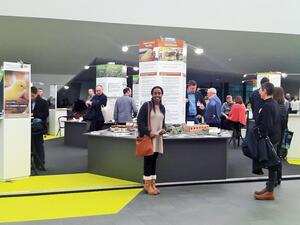
RLC PhD student attends BIOFACH 2018 in Nuremberg
RLC PhD student Juliet Wanjiku Kamau attended BIOFACH 2018, a world organic trade fair which brings together stakeholders in the organic food sector, and participated in discussions on challenges currents trends in the organic food sector. This year’s trade fair was held in Nuremberg, Germany. Juliet was in accompanied by Dr. Amudavi, Executive Director of Biovision African Trust and member of her PhD advisory team. The event exposed participants to the state of the art technology in the organic sector, new products and markets.


